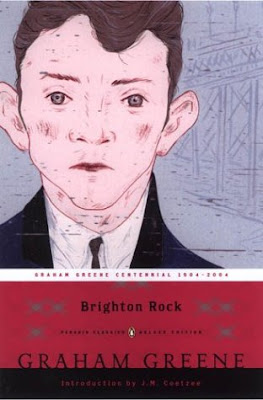Published 1938, 247 pages
Characters: B
Writing: B+
Plot: B-
Pacing: B-
Poignancy: B+
Given the time period, the tone, the air of danger that pushes the book to its swift start, one might expect Brighton Rock to be a noir, or at least an gangster thriller. But dark as the novel is, Graham Greene has a different agenda. Brighton Rock is more of a character-piece than a noir, a meditation on the nature of good and evil rather than their methods, and its memorable young villain quickly steals the focus of the story. It's nice little twist, and Greene's skill at unraveling characters' motivations in powerful literary bursts drives the novel to interesting depths.
Brighton Rock is mostly the story of Pinkie, a 17 year old gangster struggling to hold on to a feeble criminal empire. After the murder of a journalist results in a few too many witnesses, Pinkie is forced to go to great lengths to keep them silent — and it's those lengths that make up this story, his mounting desperation at the incompetence of his allies, and his reconciliation at his own inadequacies. Pinkie makes for an interesting character, a young, somewhat naive boy described as "pure evil" more than once, who understands better than anyone else what he is and what he's capable of. He feels little remorse, and is portrayed as almost inhuman, incapable of relishing the joys that those around him partake in. He doesn't drink, has no interest in women, doesn't take the time to savor all the stereotypical vices that gangster characters are known for. He is cast almost entirely in moral darkness, while his adversary — an overly-happy, overly-noble woman named Ida, determined to avenge the death of a man she barely knew — engages in "good" simply for the virtue of it. These characters are assessed again and again from each other's perspective, but whatever his message was meant to be, Greene had the insight necessary to make each perspective believable. When Pinkie and his girl address why they don't want to be good, like Ida — who comes off as kind-of obnoxious and self-righteous — it's fully believable, even understandable.
Greene is exceptionally skilled at short bursts of character insight — one or two sentence denouements wrapping up some character action — and its a testament to his powers of characterization that the villains of the novel are often more sympathetic than the woman who would be the hero. His prose is strong throughout, but in these moments it manages to achieve lasting poignancy. Interestingly, Greene consistently focuses on such small, action-related revelations, yet does little to explain the underlying motivations of his characters. Pinkie is interesting enough, but when he's presented again and again as simply evil, with no explanation or even backstory, it begins to pull apart the drama. Convincingly scripted characters can still benefit from complex motivations, and everyone here mostly acts a certain way because it's the way they are. They're the sort of characters you want to take by the shoulders and shake, until they get some sense. Brighton Rock is far from the crime-thriller it seems to be at first — everything is a slow burn, good and evil laying their plans but rarely coming face to face. The pacing is so steady that I sometimes found it difficult to read more than a few pages at once. It's the sort of book that is savored, and contemplated later, but is just gripping enough to get you through.


No comments:
Post a Comment